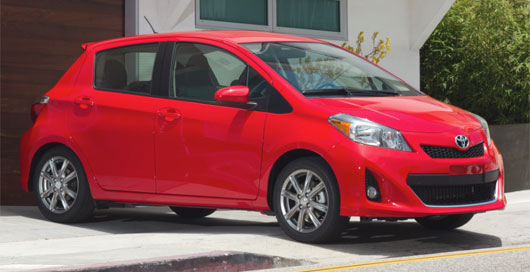2012 Toyota Yaris
When the unconventional Toyota Yaris replaced the less than thrilling Toyota Echo here in 2007, it wasn’t too difficult to make a splash among mostly boring sub-compact rivals. But since then the segment has really heated up, getting far more sophisticated and going mainstream. So, the timing for a new Yaris couldn’t be better. So let’s see if Yaris can make waves again.
The 2012 Toyota Yaris, available as either a 3 or 5-door hatchback, rolls into the sub-compact segment both bigger and sportier than ever before. And keeping with the revised mission, the 4-door sedan is no more. The wheelbase of Toyota’s entry-level model has grown 2-inches to 98.8, and overall length has increased by almost 3-inches to 153.5.
Styling remains similar; though results are less rounded and more angular. A more aggressive front fascia features a large, lower grille opening and deep cutouts for the optional fog lights. Sweptback headlights lead directly to long A-pillars and an arched roof that abruptly drops off at the rear hatch.
On the profile, that roof combines with rising door panels for side glass that quickly narrows towards the back. Our SE model keeps the sportier theme going with a rear spoiler, simulated rear diffuser, and chrome exhaust tip.
 As is usually the case, bigger exterior dimensions lead to increased interior dimensions. But beyond bigger, the Yaris interior has taken a huge step-up in quality, as well. The driver-oriented dash is a gigantic improvement over the previous gen’s center-mounted gauge cluster. Information is still minimal, but the SE does include a trip computer.
As is usually the case, bigger exterior dimensions lead to increased interior dimensions. But beyond bigger, the Yaris interior has taken a huge step-up in quality, as well. The driver-oriented dash is a gigantic improvement over the previous gen’s center-mounted gauge cluster. Information is still minimal, but the SE does include a trip computer.
Lots of storage nooks give you plenty of room for all of those little items that usually find their way into a cup holder. There’s even a small storage shelf in the dash, just above the glove box. The SE’s 6-speaker sound system has a cool aftermarket look to it, and includes both AUX and USB inputs.
Even our biggest staff members found plenty of room and comfort in the front seats, and surprisingly, in the back as well; though seats are very flat, and three across is uncomfortable in every sense of the word. Trunk area is nicely finished with a wide and flat load floor and seat backs fold 60/40 to expand the 15.6 cubic-feet of cargo space.
Behind the wheel, the Yaris feels like an upscale Scion; it’s quiet and is far more solid than before.
While it doesn’t quite match the 40-mpg’s of some its rivals, fuel economy is quite good. Government Fuel Economy Ratings for our SE 5-door with a 5-speed manual transmission are 30-City and 38-Highway. We averaged a very good 36.3 miles-per-gallon of Regular. The Energy Impact Score is also very good, just 10.4-barrels of oil consumed per year, while emitting just 4.5 tons of CO2 annually.
Of course, all those numbers are courtesy of a small 1.5-liter I4 that manages a meager 106-horsepower and 103 pound feet of torque. But, out on the road, that engine provides nicely adequate power. Gears are well matched, and a surprising amount of low to mid-range torque means you don’t have to constantly shift; we were fairly impressed. But, much like the Toyota Camry, there’s nothing truly exciting about the Yaris in day to day driving; it’s just a very well built small car.
 So, we were not expecting the Yaris to excite us on our test track either. But we did come away impressed with good clutch feel and a well working shifter. Still, 0-60 in 9.7-seconds, and 17.5-seconds to reach the end of the quarter mile at 79 miles-per-hour, is about as slow as we want to go.
So, we were not expecting the Yaris to excite us on our test track either. But we did come away impressed with good clutch feel and a well working shifter. Still, 0-60 in 9.7-seconds, and 17.5-seconds to reach the end of the quarter mile at 79 miles-per-hour, is about as slow as we want to go.
On our first few trips through the cones we found a very nervous rear end, with stability control working overtime to keep it in check. Once we backed off a little and got used to the lack of steering feel, everything calmed down to normal. Still the Yaris can’t compare to more capable rivals like the Honda Fit and Ford Fiesta.
Braking was quite good, however. Our SE’s all-disc ABS stoppers produced short 124-foot halts from 60 with a nice firm pedal. Stops were consistently smooth and straight; the base Yaris’ comes with drum brakes in the rear.
And that base Yaris starts at only $14,875, while our sporty SE stickers for $17,160.
We really don’t think the 2012 Toyota Yaris will make any meaningful waves. Still, it has improved from being almost a curiosity to a very decent little car. It offers impressive comfort, real-world mid-30 mpg’s, 9-standard airbags, plus Toyota dependability. All of that makes it a fine entry-level choice for the under 30 set.
Specifications
- Engine: 1.5-liter I4
- Horsepower: 106
- Torque: 103 lb-ft.
- 0-60 mph: 9.7-seconds
- 1/4 mile: 17.5 seconds @ 79 mph
- EPA: 30 mpg city/ 38 mpg highway
- Energy Impact: 10.4 barrels of oil/yr
- CO2 Emissions: 4.5 tons/yr






